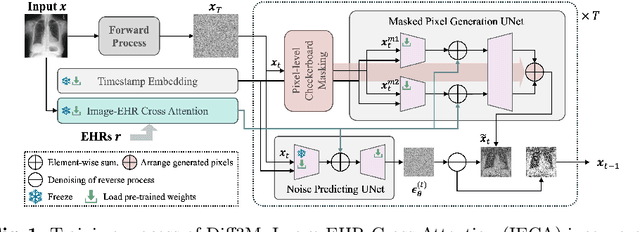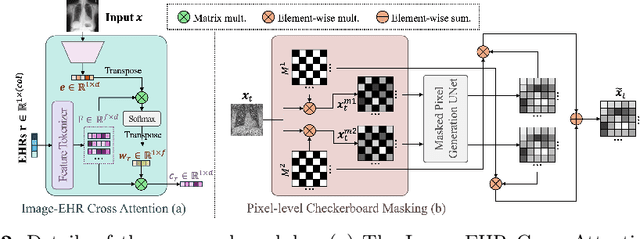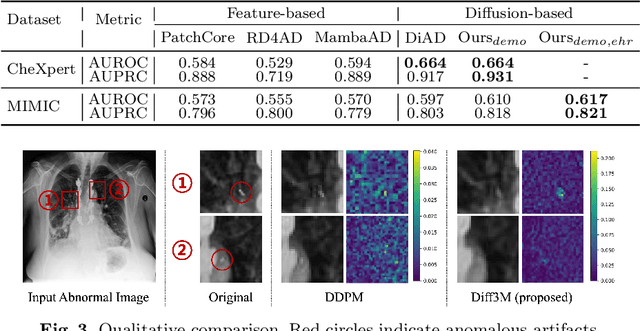Harim Kim
Harnessing EHRs for Diffusion-based Anomaly Detection on Chest X-rays
May 22, 2025



Abstract:Unsupervised anomaly detection (UAD) in medical imaging is crucial for identifying pathological abnormalities without requiring extensive labeled data. However, existing diffusion-based UAD models rely solely on imaging features, limiting their ability to distinguish between normal anatomical variations and pathological anomalies. To address this, we propose Diff3M, a multi-modal diffusion-based framework that integrates chest X-rays and structured Electronic Health Records (EHRs) for enhanced anomaly detection. Specifically, we introduce a novel image-EHR cross-attention module to incorporate structured clinical context into the image generation process, improving the model's ability to differentiate normal from abnormal features. Additionally, we develop a static masking strategy to enhance the reconstruction of normal-like images from anomalies. Extensive evaluations on CheXpert and MIMIC-CXR/IV demonstrate that Diff3M achieves state-of-the-art performance, outperforming existing UAD methods in medical imaging. Our code is available at this http URL https://github.com/nth221/Diff3M
Cactus: Towards Psychological Counseling Conversations using Cognitive Behavioral Theory
Jul 03, 2024



Abstract:Recently, the demand for psychological counseling has significantly increased as more individuals express concerns about their mental health. This surge has accelerated efforts to improve the accessibility of counseling by using large language models (LLMs) as counselors. To ensure client privacy, training open-source LLMs faces a key challenge: the absence of realistic counseling datasets. To address this, we introduce Cactus, a multi-turn dialogue dataset that emulates real-life interactions using the goal-oriented and structured approach of Cognitive Behavioral Therapy (CBT). We create a diverse and realistic dataset by designing clients with varied, specific personas, and having counselors systematically apply CBT techniques in their interactions. To assess the quality of our data, we benchmark against established psychological criteria used to evaluate real counseling sessions, ensuring alignment with expert evaluations. Experimental results demonstrate that Camel, a model trained with Cactus, outperforms other models in counseling skills, highlighting its effectiveness and potential as a counseling agent. We make our data, model, and code publicly available.
COCOA: CBT-based Conversational Counseling Agent using Memory Specialized in Cognitive Distortions and Dynamic Prompt
Feb 27, 2024

Abstract:The demand for conversational agents that provide mental health care is consistently increasing. In this work, we develop a psychological counseling agent, referred to as CoCoA, that applies Cognitive Behavioral Therapy (CBT) techniques to identify and address cognitive distortions inherent in the client's statements. Specifically, we construct a memory system to efficiently manage information necessary for counseling while extracting high-level insights about the client from their utterances. Additionally, to ensure that the counseling agent generates appropriate responses, we introduce dynamic prompting to flexibly apply CBT techniques and facilitate the appropriate retrieval of information. We conducted dialogues between CoCoA and characters from Character.ai, creating a dataset for evaluation. Then, we asked GPT to evaluate the constructed counseling dataset, and our model demonstrated a statistically significant difference from other models.
 Add to Chrome
Add to Chrome Add to Firefox
Add to Firefox Add to Edge
Add to Edge